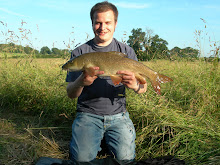

EVERYBODY knows that nature is dog-eat-dog world and last week I saw a startling reminder that beneath the water's surface fish are constantly fighting to keep their place in the food chain. It also proved that the chub must be amongst the toughest of fish that swim in our waters.
With a few hours on the bank in my sights last friday I headed for the river Whitewater on the Hampshire/Berkshire border. It was a lovely day as I made my way through fields towards the river, with the low winter sun in full blaze and fluffy, picture-book clouds scattered across a bright blue sky .
Normally on a short session, I'd go from swim to swim giving each about 20 minutes for a chub to make its presence known. Time was against me however, so I chose to sit it out in a favourite swim and wait for the sun to drop behind the trees and encourage the fish to feed.
Using a quiver tip with a light-ish running rig, I opened my rucksack to find I'd left the liquidised bread intended for the feeder at home. A quick re-think saw some micro pellets scalded in some hot water from my flask and a pellet cone sitting on top of my cheese paste hook bait, with a small lead replacing the feeder.
I duly cast in and sat back to enjoy the scenery and the sight of a buzzard circling over the field to my right. This particular bit of Whitewater is one of the most picturesque fisheries I've seen and it's always a pleasure to be there. Bites are simply a bonus at such a place, particularly when I had the entire stretch to myself.
A few casts later and an unmissable drop-back snapped me out of the trance induced by my surroundings. It was immediately followed up by some sharp pulls on the tip and I struck into a decent fish that quickly moved into the main flow of the river and out of the slack water where it had found my bait.
After a good scrap that gave away nothing of what I was about to discover, a chub surfaced with what I initially thought was a leaf stuck to its back. I netted it and closer inspection revealed that the fish was missing a large chunk of flesh leaving a cavity so deep that bone was visible.
As the photos show, this chub had had a very lucky and very recent escape from the jaws of death in the shape of what I reckon was a pike. You can see where it was grabbed from the U-shaped markings that start opposite the area where flesh had been removed and fit the shape of a pike's jaw.
I can't believe the fish was willing to feed so soon after being attacked. Not only will chub feed in the lowest of temperatures long after other species have switched off, it seems even a gaping wound won't deter them. Perhaps the low temperature of the water was keeping the wound numb and it appears that no organs were damaged. Hopefully the risk of infection will also be reduced by the cold water and this slightly lighter-than-usual four-pounder will live to fight another day.
No doubt the smell leaking from the wound will be particularly enticing to other predators hoping to pick off an easy meal but I'll still be looking out for a fish with a very recognisable scar next season.
